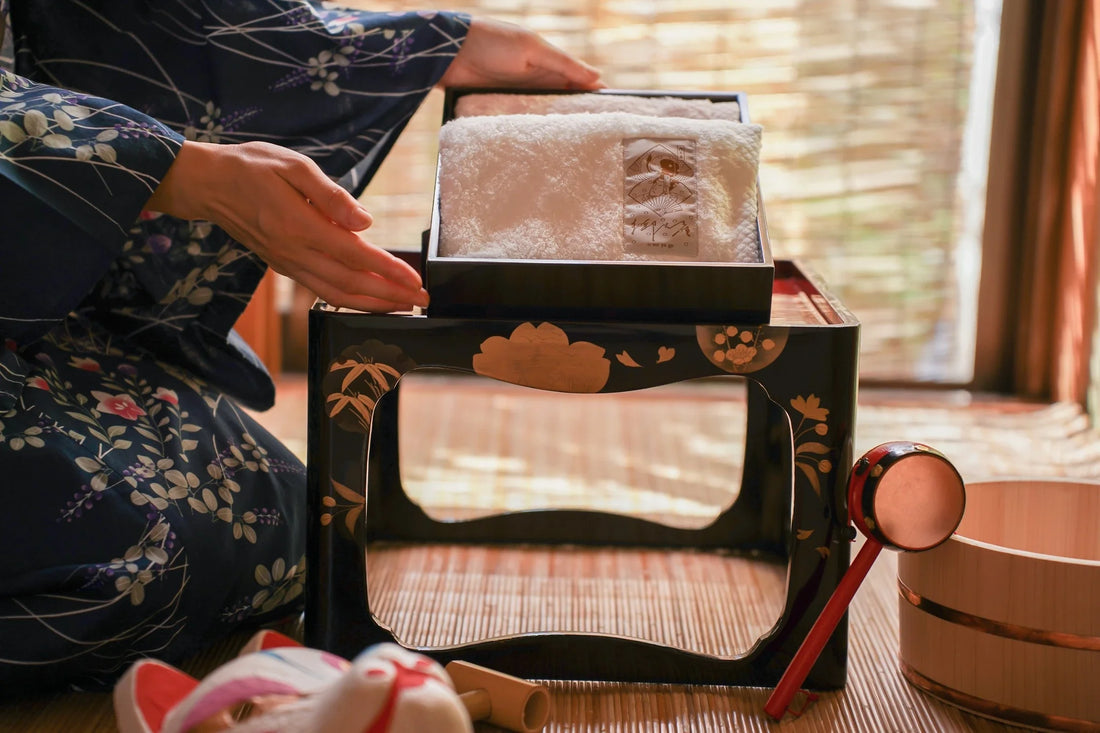In Japan, giving and receiving gifts is not just a tradition; it's a crucial part of Japanese life, like an important thread that ties them together. It's not just a gift; it's a strong way of saying thank you and showing respect.
Let's take a closer look at the gift-giving culture in Japan.
What is Omiyage and Temiyage ?
The word omiyage means souvenir or gift. When people travel, they bring back these unique gifts not for themselves but to share with family, friends, and coworkers. It's a way of showing how much they care about the people in their lives.
Typical omiyage items include simple keepsakes such as Imabari towels, matcha green tea, or Omamori charms.
Now, let's talk about temiyage. This term means a gift you hand to someone you're visiting. It's a way of saying thank you for something nice they did for you or something you hope they'll do for you. When tourists from other countries visit a Japanese home, it's like a tradition to bring temiyage to thank the people who live there.

Gift Giving in the Special Occasions
In Japan, apart from yearly occasions like birthdays and celebrations, there are specific periods, namely 'Ochugen' and 'Oseibo,' dedicated to the traditional practice of giving gifts.
Ochugen
Ochugen happens on July 15th, blending an old Taoism festival (based on the lunar calendar) with the Buddhist festival known as 'Obon' in Japanese. People give gifts during Ochugen to express gratitude to important people in their lives, such as children, teachers, and family members.
When it's time for Ochugen gift-giving, presents are wrapped with white and red ribbons. These are seen as symbols of luck and prosperity in Japan.
Oseibo
Oseibo happens around the same time as Christmas, from late November to December 20th. It's like a Japanese Christmas where people give gifts to show appreciation for their friends, family, and co-workers.
These gifts can be small or more significant, and there's no pressure to give or receive them. So, you'd definitely love to receive an Oseibo gift as a surprise!
Gift Giving in the Japanese Workplace
Here are some tips or customs you could consider when giving gifts to your colleagues. Sticking to these traditions can foster a harmonious professional relationship.
Visiting Japan from Abroad
If you're going to Japan for business, expect to experience Japan's famous hospitality. You can show your appreciation by bringing a meaningful gift from your home country. Before your trip, think about who you'll meet and whether giving a gift is suitable.
Often, a Japanese company may assign someone to assist you during your visit. It's a good idea to give a personal gift that's appropriate for an office, like a high-quality pen or a business card holder.
For group gifts, safe choices include shelf-stable local or regional treats from your home country that can be easily shared in the office. As with any gift in Japan, the presentation and wrapping matter, so keep that in mind before your trip.

After your work travels
After coming back from a business trip, it's a tradition to bring back omiyage from the place you visited. This not only shares a part of your journey but also shows appreciation to your colleagues who have supported your work.
Going to Networking Events and Conferences
When you go to networking events, conferences, or workshops, it's a good idea to bring small gifts (omiyage) from your area. These gifts can make it easier to start chatting with new people and build relationships. Offering them is a friendly gesture and shows you're thankful for the chance to meet and share thoughts with others.
Saying Goodbye to a Colleague
When a colleague is retiring or going to a new job, it's a chance to thank them for all they've done. Giving them a thoughtful present is a nice way to wish them well as they leave
Japanese Etiquette in Giving and Receiving Gifts
You may find it interesting that there are specific etiquette rules about giving and receiving gifts in Japan. Here's an easy explanation:
1. The Art of Wrapping
When you give a gift in Japan, be sure to wrap it carefully. A well-wrapped present is just as valued as the gift itself. Regardless of the gift's actual cost, a beautifully presented gift is always appreciated.


The image shows Imabari towels wrapped in a furoshiki.
2. Presenting the Gift Sensibly
The rule of gift-giving varies based on whether you're gifting an individual or a group. If it's a gift for a group, make sure everyone is present before giving it. On the other hand, if it's a gift for one person, it's polite to give it in private to prevent others from feeling left out.
3. The Technique of Giving and Receiving
Always give and receive gifts with both hands. This practice indicates that you genuinely value the gift exchange process. Notably, the practice is not just limited to gifts; it's followed by exchanging business cards, graduation certificates, and more.

4. Reciprocation is Essential
Finally, it's important to remember the practice of reciprocation. When someone receives a gift, they typically feel compelled to give something in return. This creates a continuous loop of generosity and thoughtfulness.
In Japan, this is known as "Okaeshi," or the act of giving a return gift.
Furoshiki - Japanese Elegant Way to Wrap Gifts
Furoshiki is a traditional Japanese cloth that is handy for carrying and wrapping things. It's usually a square piece of fabric made from cotton. And you can use it for different tasks like wrapping gifts, carrying your belongings, or keeping items organized in your bag.
In Japan, people often use furoshiki to wrap their lunch or make their daily activities easier. It is also a fancy way to wrap gifts in various sizes and shapes. These cloths come in many different patterns and colors, so you can choose one that fits your style. You can opt for a plain, dark color for a simple look, or go for a more colorful design with flowers, cute animals, or bold patterns, especially if you want to use it for wrapping gifts.
Furoshiki cloths are usually around 30x30 inches in size, similar to a square pillowcase, but you can also find them in smaller or larger sizes depending on what you need.

Final Words
Gift-giving is a refined art rich in tradition and etiquette among the Japanese. It's essential for expressing respect, building relationships, and maintaining harmony across both social and professional settings.
By really getting into these practices and being thoughtful, you can make a good impression and get along well with others in Japan.
Whether you are looking for the perfect omiyage, temiyage, or a thoughtful gift for a special occasion, our Japanese Imabari towels make a superb choice. Discover our collection and experience the luxury and craftsmanship of Imabari towels today. Shop Now!
FREQUENTLY ASKED QUESTIONS
What is a traditional Japanese gift?
Traditional Japanese gifts could be classic items like a yukata (summer kimono), a tea set, a fan, or a calligraphy set. Japanese also enjoy good-quality food or treats such as snacks, tea, or sake.
Are towels a great gift?
Towels are a great gift because they're so useful, and Imabari towels especially from Japarcana make a nice choice for any season. They're especially perfect for people beginning a new phase in life. Whether for newlyweds, recent graduates, or someone who just moved into a new place, a towel can be a thoughtful and appreciated present.
What gifts are avoided in Japan?
There's a superstition that potted plants can cause sickness, and giving anything in sets of 4 or 9 is seen as unlucky.


